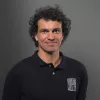Hi Moon, unfortunately the Asian Games were a promised land that failed to deliver due to the insistence of the Indonesian competition manager and his financial relationship with a certain emerging federation in the Asian continent.
Here is the text of a letter ( one of very many) that were sent to the organisers and the Indonesian federation while we tried to advance the organisation of the event.
01 August 2017
For the attention of:
Mr Chairman INASGOC
Mr Chairman KOI
Dear Sirs,
As Technical Delegate for the paragliding disciplines I must inform you that I cannot accept the site of Puncak as the venue for the paragliding cross country event on the grounds of safety for the competing pilots from all nations.
I understand that the organisers of the paragliding disciplines are insisting on Puncak in spite of its unsuitability for cross country flying. This is a mistake. The site is not safe for cross country flying.
Paragliding cross country competition is a tactical and strategic discipline where 100 pilots will be competing in 3 dimensions moving through the sky in close proximity to each other. The risks of collisions and accidents in a venue with no thermic activity, no separation from the terrain and a congested environment at ground level will be extremely high.
Cross country flying relies on the currents of warm air to lift the pilots to altitudes above the level of the terrain allowing them fly safely with adequate separation between each pilot and the ground.
A site with no thermic activity condenses the game into a small area close to the terrain - trees, houses, cables, roads etc – limits room for safe manoeuvring and drastically increases the risk of accident and injury to the competitors and 3rd parties.
In addition to the adverse meteorological conditions for cross country flying in the Puncak area, which include little thermic activity, low cloud base and a predominant wind direction from the back of the launch area, the launch area at Pasir Sumbul is dangerous.
There is no space to allow pilots to make the necessary preparations and safety checks before flying.
The metal launch ramp is unprotected, with a 5m drop to the ground below and obstructions alongside.
The area has been partially cleared below the ramp leaving sharp trees stumps and obstacles that could potentially be fatal. The lives of pilots are at risk in the event of a failed launch or problem at the time of inflation of the glider.
I will not allow pilots to launch from this ramp.
The lower launch at Gunung Mas is not suitable for the event due to the low altitude and risk of congestion close to the terrain.
The traffic and access conditions that we have personally witnessed at the site prejudice the safety of the pilots since it will be impossible to guarantee a rapid response and evacuation in the event of injury.
I have stated on numerous occasions during the previous months that Puncak is not a suitable site for a cross country paragliding competition and that an alternative venue should be sought.
The Competition Manager and Venue Manager have chosen to ignore my technical advice, based upon my many years of experience in paragliding competition organisation and competition flying, in order to follow their own personal agendas. I will not risk the safety of the pilots from many nations who will compete in the events (Test Event 2017 and Asian Games 2018) by approving rules and venues that are unsafe and unfair.
Safety and fairness for competitors of all nations are the fundamental principles of the Olympic ideal. That the organizing committees of the host country in a prestigious international event will actively manipulate and impose unsafe rules to prejudice the international competitors is negligent and unethical.
I will not put my reputation and that of my team in jeopardy by supporting this event should the venue remain as Puncak.
I respectfully request that you seriously reconsider the venue for the paragliding cross country discipline in order that the event can be properly managed and organized to promote the future of Indonesia as a venue and location for international paragliding competition and tourism.
Proceeding with an event in Puncak will demonstrate that the organizing committee have little respect for the Asian paragliding pilots and will damage the image of Indonesia amongst pilots worldwide.
Please be assured that I as TD and my team are fully committed to continue with the project once the venue is changed and the rules and technical books are updated.
With best regards,
GSS
Technical Delegate Paragliding Asian Games 2018
Secretary General Asian Continental Paragliding Association
______________________________________
& here a Basecamp post from ACPA:
ASIAN GAMES TEST EVENT 2017
Over the last 3 months Mr Gin has been trying to agree the rules and technical handbooks for the Asian Games but has had considerable opposition from the Competition and Venue managers.
The site that they are proposing to use at Puncak is not suitable for an XC event.
The local XC pilots are in agreement with this assessment. The meteo conditions are such that there will be no chance of Race tasks, the predominant wind is over the back, the humidity means there are few thermals and the daily ´flyable window´ is extremely short. The metal take off ramp is dangerous (unprotected, with a 5m drop to the ground below and suitable in size for 1 glider only) and there is insufficient space for 100 pilots to prepare. The competition cannot be run safely and sportively at this site.
Mr Gin has been fighting for a move to a suitable site at Batu Dua which will give the chance of running a safe, fair and sportive event.
The Competition Manager has opposed this and has now had Mr Gin removed as Technical Delegate for the event.
To remove Mr Gin, who as we all know is probably the most respected pilot/organiser/designer in the world shows a lack of respect to all Asian XC pilots.
Unfortunately, it is possible that the organisers will insist on running the test event at Puncak.
We are sorry that this notice comes so late but we have been trying our best through all available channels to have the event moved, unfortunately time is running out.
________________
Here, the end of Mr Gin as Technical Delegate in a mail from the Competion manager citing CIVL as the proposing party for an alternative:
"Herewith we'd like to inform you about the letter from Asian Federation, regarding the approval to FAI-CIVL proposal, on expertise personnel as TD for AG.
As you may know that AG is multi event. The related parties are many. We have to consider many aspects, and we have to deal with many elements.
The movements that you have made, without prior notice to CM, are trigger for uncontrollable problems. The pressure was arising in order to solve the problem immediately, and it was coming from many parties, including OCA, INASGOC, FAI, etc.
At this point, we can not protect you anymore, and we have been forced (by situation) to accept the proposal from FAI-CIVL regarding personnel, and we have to discontinue the works with you as TD for AG.
____________________________________________
The reply to CIVL about the above email:
I got a mail below from Wahyu (Competition Manager) and it is hard to understand logically.
I just inform you about my version.
The biggest issue is the Venue for the XC competition and technically it is not so easy to manage the XC competition for 180 pilots there, it is too small TO and low altitude.
Wahyu said this is only place for the Asian Game which is not true. FASI said we can move the venue called BATU DUA where is very good place for the XC and Accuracy.
I had a big pressure to design the competition safe and fairness but Wahyu and Djoko does not care for that and saying " we just have to distribute the medals" which I cannot accept.
There are tones of rumors of them about money and etc.
I hope you know what you are doing now with him.
I believe that it is such a important event for Paragliding sports and whole world would like to see successful and continuing in Asian game, even the Olympic.
You never ask me any information and send others to replace me. Are you sure CIVL will take all the risk?
I really disappointed what you are doing.
I really do not understand logically.
‐--------------------
These are just a few samples of the very many emails that went to & fro between the TD, MD, CIVL and the local Competition organiser before the test event. The full saga remains documented.
Unfortunately, sometimes you just have to give up the fight in the face of overwhelming adversity! We tried very very hard, but we failed in this instance.











Comments
Great info @Moon and should go into the Professionalisation working group - very unfortunate outcome for all. Lets fix it.